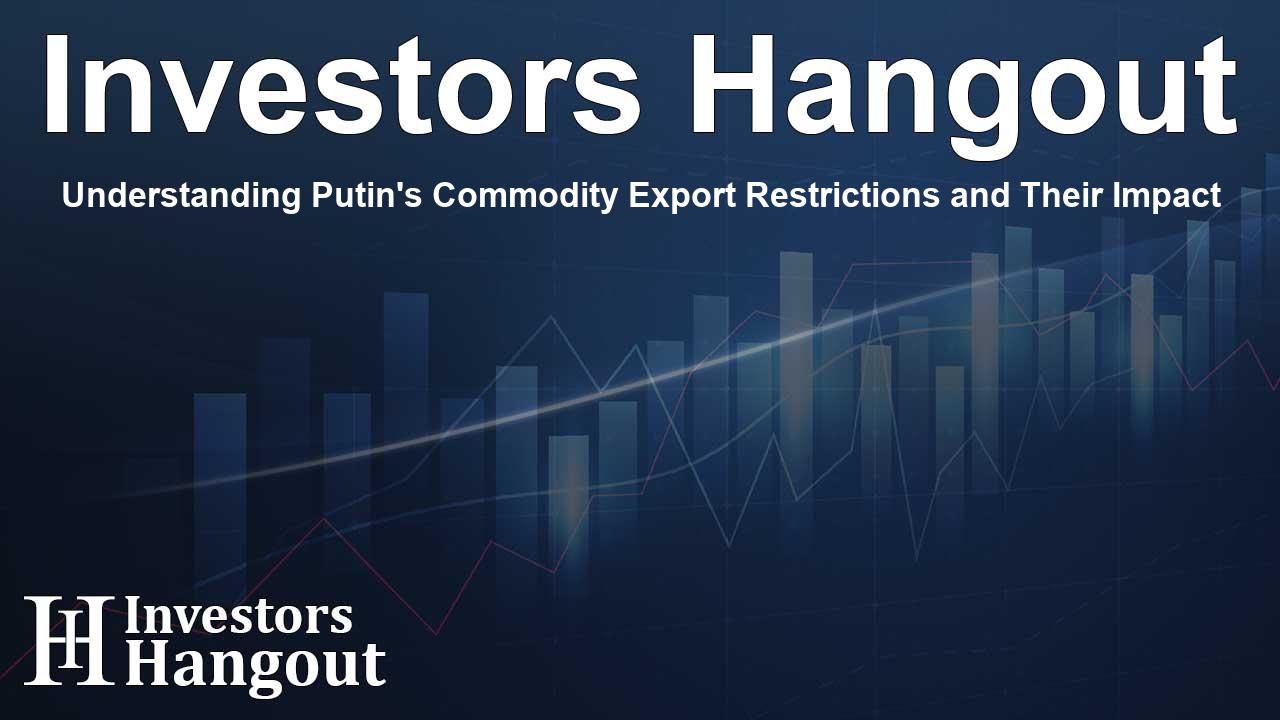Understanding Putin's Commodity Export Restrictions and Their Impact

Understanding Putin's Proposal on Commodity Exports
Recently, Russian officials and industry leaders found themselves in a state of confusion after President Vladimir Putin made unexpected comments about possible limits on exporting strategic commodities. This move appears to be a response to ongoing Western sanctions, raising questions about its practicality and the potential impact on the Russian economy.
Reactions from Russian Officials
At a government meeting, President Putin instructed Prime Minister Mikhail Mishustin to come up with plans to limit certain export commodities. This suggestion took many within the Russian government and diverse industries by surprise, leaving them feeling unprepared for actions that could threaten the country’s economic interests.
An individual from one affected company shared their bewilderment, stating that the announcement felt sudden and unexpected. Another industry insider cautiously compared the proposed measures to “shooting yourself in the foot,” expressing worries about the potential damage to key industries that depend heavily on commodity exports.
Consequences for Major Russian Industries
Several sectors of Russia's economy, notably the oil, gas, nickel, titanium, gold, and diamond industries, are already grappling with significant challenges from the existing sanctions and trade restrictions imposed by Western countries. The recent changes in the global market have brought uncertainties regarding profitability, particularly for major companies like Rostec, Rosatom, and Nornickel, the top nickel producer.
Nornickel, in particular, reported a staggering 22% decline in profits for the first half of the year. The company is struggling to adjust its export focus towards Asia while facing the added pressures from sanctions and low nickel prices, which they described as a “perfect storm” for their operations.
Global Ramifications of Uranium and Nickel Exports
President Putin specifically mentioned uranium, nickel, and titanium exports in his remarks. The concern is that substantial restrictions on these commodities could lead to significant foreign currency losses for key Russian companies. Rather than being just an internal policy shift, these restrictions could trigger broader ripple effects throughout the international market.
A government insider noted that there might be exemptions for so-called “friendly” countries, like China. This suggests that Russia is maneuvering its relationships with other powers while tensions with the West continue to escalate. While the domestic market may not exhibit immediate reactions, the global prices for commodities like nickel did see short-term rises following Putin’s announcement, although the overall supply remains strong.
The Bigger Picture of Economic Tensions
As the conflict with the West intensifies, particularly due to the ongoing situation in Ukraine, Russia seems to be weighing its options in response to perceived aggressive actions from Western nations. Limiting commodity exports could potentially create a competitive disadvantage at a time when sanctions are putting strain on the economy.
Even with the widespread shock and apprehension among industry players, Kremlin spokesperson Dmitry Peskov insisted that any implementation of such restrictions is still speculative. He emphasized that while the proposal is under consideration, it should not compromise Russia’s economic stability amid a complex geopolitical landscape.
Conclusion
In conclusion, President Putin's suggestion to impose restrictions on strategic commodity exports is creating a stir in the political sphere, yet its actual impact remains unclear. The internal and external consequences of such a move could be significant. Company executives, government officials, and industry insiders are now left to consider how to balance navigating sanctions with maintaining economic stability, highlighting the delicate nature of Russia’s current geopolitical strategies.
Frequently Asked Questions
What commodities did Putin suggest restricting?
President Putin highlighted uranium, nickel, and titanium as specific commodities he was considering for export restrictions.
How have Russian industries reacted to the proposal?
Many Russian officials and industry leaders expressed shock and concern, indicating that the proposal could harm the broader economy.
Which companies may be impacted by these restrictions?
Key players like Rostec, Rosatom, and Nornickel, which employ about a million workers, may see significant losses.
What is the global response to these potential restrictions?
The international market responded with a temporary increase in nickel prices, yet overall supply remains strong and stable.
Will the proposed restrictions exclude any countries?
There is discussion that nations labeled as “friendly,” including China, may be exempt from these export restrictions, showcasing geopolitical maneuvers.
About The Author
Contact Riley Hayes privately here. Or send an email with ATTN: Riley Hayes as the subject to contact@investorshangout.com.
About Investors Hangout
Investors Hangout is a leading online stock forum for financial discussion and learning, offering a wide range of free tools and resources. It draws in traders of all levels, who exchange market knowledge, investigate trading tactics, and keep an eye on industry developments in real time. Featuring financial articles, stock message boards, quotes, charts, company profiles, and live news updates. Through cooperative learning and a wealth of informational resources, it helps users from novices creating their first portfolios to experts honing their techniques. Join Investors Hangout today: https://investorshangout.com/
The content of this article is based on factual, publicly available information and does not represent legal, financial, or investment advice. Investors Hangout does not offer financial advice, and the author is not a licensed financial advisor. Consult a qualified advisor before making any financial or investment decisions based on this article. This article should not be considered advice to purchase, sell, or hold any securities or other investments. If any of the material provided here is inaccurate, please contact us for corrections.
